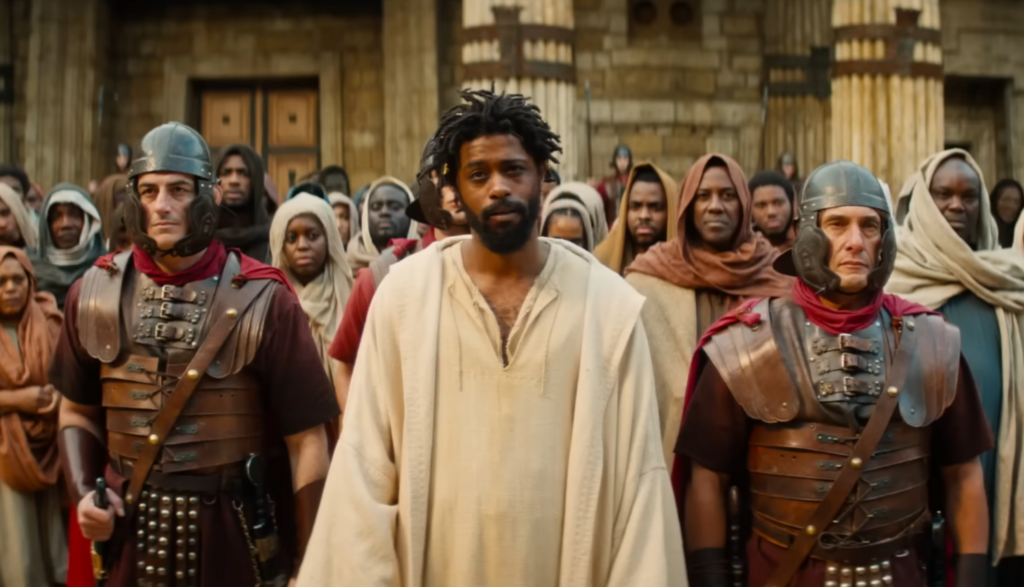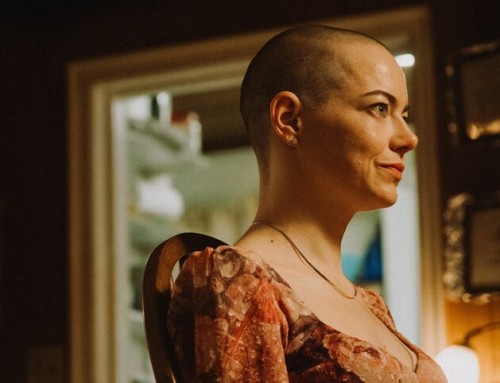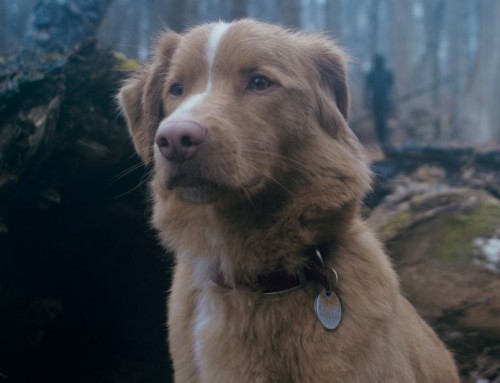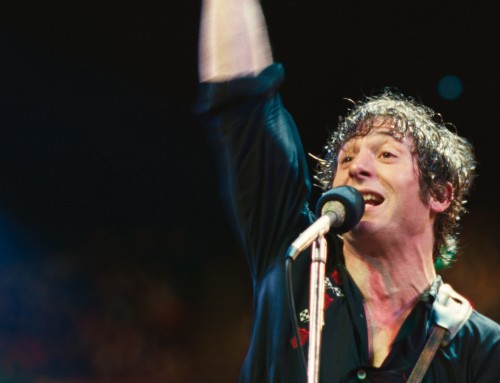The biblical epic was a Hollywood mainstay decades ago, particularly in the 1950s and early 1960s. The genre has largely fallen out of favor, with religious films now largely the province of small-scale dramas and sports movies. However, Jeymes Samuel must have a soft spot for the favored genres of long ago. Because following his 2021 Western The Harder They Fall, his sophomore feature is an application of his signature style to a large-scale comedic retelling of the story of Jesus. The film has moments of real power, particularly in the final act, but a meandering early plot, tonal issues, and some moments of flat comedy meant that The Book of Clarence wasn’t the success that The Harder They Fall was.
The film begins in media res with a chariot race through the streets of Jerusalem in the year AD 33. Clarence (LaKeith Stanfield) and his friend Elijah (RJ Cyler) are up against Mary Magdalene (Teyana Taylor). The race is close until Clarence and Elijah are attacked by the “gypsies” and their leader Cabbage (Chase Dillon). Upon their recovery, they see Mary Magdalene giving her winnings to the poor while the men now have to go visit local power broker Jedediah the Terrible (Eric Kofi-Abrefa) to let him know that they’ve lost his chariot, his horse, and the money they borrowed to enter the race. Jedediah lets them know that they have thirty days to repay him or they’ll be killed. Returning home, Clarence tells his mother Amina (Marianne Jean-Baptiste) that he just wants to be someone – to take care of her and to win the heart of Varinia (Anna Diop), a local beauty who also happens to be Jedediah’s sister. Clarence bemoans that his twin brother Thomas (also Stanfield) has abandoned their mother to become one of the twelve apostles of Jesus of Nazareth (Nicholas Pinnock).

While Clarence has made perfectly clear that he doesn’t believe that Jesus is the Messiah, he knows that the apostles are treated well, and hopes that if he’s connected with them, Jedediah may show leniency. He goes to John the Baptist (David Oyelowo) for a baptism and then goes to visit the apostles. They laugh him off, though Judas (Micheal Ward) sets Clarence the task of showing that he is serious by freeing a group of gladiatorial slaves owned by Asher the Torturer (Babs Olusanmokun). Asher states that he can take Barabbas (Omar Sy), the largest of the men, if Clarence can beat him in combat.
Through a clever use of light, Clarence wins, and Barabbas joins him. When he’s brushed off again by the apostles, Clarence decides to beat them at their own game by claiming that he is also a Messiah. He visits Jesus’s mother Mary (Alfre Woodard) to find out how Jesus does his miracles (Clarence calls them “tricks”). When Mary assures him that what Jesus does is real, Clarence enlists Elijah and Barabbas to help him con people into believing that he can also do miracles. Elijah and Mary Magdalene later see Jesus’s miracles in action, swaying Elijah to belief. Riches follow for Clarence, though after seeing how the Romans treat the people around him, he starts using his gains for good. The film’s final act begins with Pontius Pilate’s (James MacAvoy) centurions arresting Clarence, threatening him with crucifixion if he won’t reveal the location of Jesus.

While the film wasn’t successful overall, there are definitely points in its favor. Samuel’s direction feels like a fresh new voice, much like it did in The Harder They Fall. He’s not afraid to take chances, even if they don’t always work. A multi-hypenate, Samuel also writes the music for his films, and the score, along with the anachronistic song choices he makes really add to the film. Rather than overusing CGI, the film shot on location in Italy, and Samuel and cinematographer Rob Hardy really take advantage of being somewhere real and with a real sense of history. The film looks beautiful and has a grand scope. The performances are also good overall. Many of the parts are smaller supporting roles, but the central trinity of Stanfield, Sy, and Cyler are all excellent. Pinnock only has a few short scenes, but he has a calm and a gravity worthy to place him high in the ranks of cinematic portrayals of Jesus.
Where the film fails for me is in the writing. As shown by the final act, there’s a really powerful look at the intersection of knowledge and belief buried somewhere in this script. Unfortunately, that act is only the last 30 or so minutes of a film that runs over two hours. The time leading up to the final act is too often tonally confused and full of jokes that fall flat. It really makes the time drag. There’s also social commentary using the Romans and the average people of Jerusalem as stand-ins for modern police and black citizens. It’s satire that’s certainly true, but always feels awkwardly placed in the context of the film. The Harder They Fall was a triumph, and The Book of Clarence, while not especially good overall, still has moments that make me look forward to what Jeymes Samuel decides to do next.
THE BOOK OF CLARENCE is now playing in theaters.









It is unfortunate to hear about this movie. The Harder They Fall was in my best-of-2021 list. Based on your reaction, I hope he makes movies as successful in quality as The Harder They Fall.
Seems interesting
I have long been on the record that social satire is dead in a culture in which reality is already stretched to the point of comedy.
I think this film is going to age well.